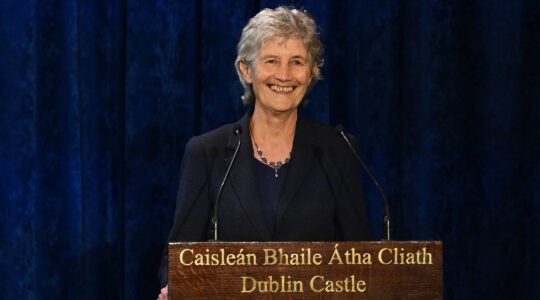
Boxing Club Prishtina, an abandoned building in downtown Pristina, is believed to have once been a Jewish institution in the Kosovo capital. (Ron Kampeas/JTA)
PRISTINA, Kosovo (JTA) – Boxing Club Prishtina is a squat building on a narrow street around the corner from the parliament in the heart of Kosovo’s capital city.
Around the corner, a popular Italian restaurant draws the young Western Europeans and Americans in button-down shirts and open-toed heels who help keep the country running. Walk the other way and you’ll find a dim hole-in-the-wall bar/gallery crammed with their Kosovar peers.
But Boxing Club Prishtina stands unattended, plaster cracked or stripped away by wind, rain and time. Its rusted metal awning droops into Mark Isaki Street.
Before World War II, the Jews of Kosovo will tell you, the building housed a yeshiva or Jewish community center or maybe both — or maybe neither. Maybe it will be restored or torn down, become a monument or a memory.
The handful of Jews remaining in Kosovo and their brethren who fled to Belgrade in the late 1990s say it is a Jewish property, and that might be enough to make it so.
Kosovo, longing for a solid footing in the West, wants the world to know that it has been good to its Jews. And its tiny Jewish community — having barely survived the 20th-century maelstrom of the Holocaust, communist rule and Balkan wars — wants government support to create tangible markers of Jewish life in the country, where more than 90 percent of the 1.8 million people are Muslims.
A centuries-old and aging Jewish community that has dwindled to a few dozen souls is bound to Europe’s newest country, with its youngest and fastest-growing population — and each is seeking validation through the other.
NEXT: Israel does not recognize Kosovo
JTA has documented Jewish history in real-time for over a century. Keep our journalism strong by joining us in supporting independent, award-winning reporting.





